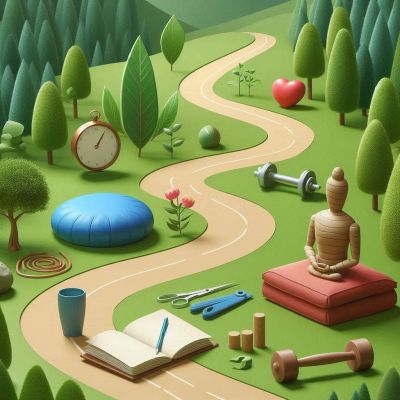Is it the map or the journey that truly shapes your resilience? As you explore the distinction between strategies and tools for mental resilience development, you’ll uncover how each element plays a crucial role in your emotional landscape. Strategies like mindfulness and goal-setting offer a framework for growth, while tools such as cognitive behavioral techniques provide practical methods for overcoming obstacles. But how do you determine which approach best suits your needs? The answer might surprise you as you consider the interplay between these components.
Understanding Mental Resilience
 Understanding mental resilience is essential for maneuvering life’s challenges effectively. It’s about your ability to adapt and bounce back from adversity, and it directly ties into your emotional intelligence.
Understanding mental resilience is essential for maneuvering life’s challenges effectively. It’s about your ability to adapt and bounce back from adversity, and it directly ties into your emotional intelligence.
When you cultivate emotional intelligence, you enhance your awareness of your own emotions and those of others, which plays a significant role in stress management. Being emotionally intelligent allows you to recognize stress triggers and employ coping strategies tailored to your unique circumstances.
Research shows that individuals with high emotional intelligence tend to manage stress better, leading to improved mental resilience. They can assess their feelings constructively and utilize techniques such as mindfulness and cognitive reframing to maintain a healthy perspective during tough times.
This proactive approach not only mitigates the impact of stress but fosters a growth mindset, encouraging you to view challenges as opportunities for personal development.
Moreover, emotional intelligence enables you to build strong relationships, which provide vital support during difficult periods. By understanding and enhancing your emotional intelligence, you’ll find that your mental resilience can strengthen, equipping you with the tools necessary to face life’s inevitable challenges with greater confidence and adaptability.
Importance of Resilience in Life
In the face of life’s inevitable challenges, resilience becomes a critical asset that empowers you to navigate difficulties with strength and flexibility. This emotional strength allows you to better manage stress, adapt to change, and bounce back from setbacks. Research shows that resilient individuals not only cope more effectively but also experience better mental health outcomes, including lower rates of anxiety and depression.
Resilience fosters adaptive coping strategies, enabling you to approach problems with a constructive mindset. Instead of feeling overwhelmed, you can dissect challenges into manageable parts, facilitating solutions rather than allowing adversity to paralyze you. This proactive approach enhances your problem-solving skills and encourages a growth mindset, where failures are viewed as opportunities for learning rather than insurmountable obstacles.
Moreover, resilience nurtures your social connections. When you’re resilient, you’re more likely to seek support from friends and family during tough times, reinforcing your emotional bonds and providing a network of encouragement.
Ultimately, building resilience isn’t just about enduring difficulties; it’s about thriving through them, laying the groundwork for a fulfilling and balanced life. Embracing resilience equips you with the tools to face whatever life throws your way.
Key Strategies for Building Resilience
Building resilience involves implementing specific strategies that can enhance your ability to cope with challenges. One effective approach is resilience training, which equips you with the tools to navigate life’s difficulties. This training often includes techniques that focus on emotional regulation, helping you manage your feelings in high-stress situations.
Practicing mindfulness can notably improve your emotional regulation. By becoming more aware of your thoughts and feelings, you can respond to stressors calmly rather than react impulsively. Additionally, setting realistic goals helps create a sense of accomplishment, further bolstering your resilience.
Another key strategy is to build a strong support network. Connecting with friends, family, or colleagues provides emotional backing during tough times. Sharing experiences and seeking advice can lead to new perspectives and solutions.
Moreover, maintaining a positive outlook is essential. Focusing on what you can control and reframing negative thoughts can foster resilience. Research shows that individuals who practice gratitude tend to have better emotional regulation, which reinforces their ability to bounce back from adversity.
Essential Tools for Resilience Development
To effectively cultivate resilience, you’ll need essential tools that empower you to navigate life’s challenges with confidence and adaptability.
These tools can help you assess your current resilience levels and guide your resilience training. Here are four critical components to evaluate:
-
Resilience Assessment Tools: Use psychological assessments like the Connor-Davidson Resilience Scale to identify your strengths and areas for improvement. Knowing where you stand is crucial for targeted development.
-
Cognitive Behavioral Techniques: Engage in exercises that challenge negative thought patterns. Techniques like reframing can shift your perspective and enhance your mental flexibility.
-
Goal-Setting Frameworks: Implement SMART criteria (Specific, Measurable, Achievable, Relevant, Time-bound) for setting resilience-building goals. Clear objectives help you track progress and maintain motivation.
-
Support Networks: Build a community of supportive friends, family, or professionals. Sharing experiences and seeking feedback can provide invaluable insights during tough times.
Mindfulness Practices for Resilience
Developing resilience goes beyond just having the right tools; incorporating mindfulness practices can greatly enhance your ability to cope with stress and adversity.
Mindful breathing, for instance, is a simple yet powerful technique that helps you anchor your thoughts and emotions. By focusing on your breath, you can create a moment of calm, which allows you to respond to stressors more thoughtfully rather than reactively. Research shows that regular practice of mindful breathing can reduce anxiety and improve emotional regulation, making you more resilient in challenging situations.
Another effective practice is gratitude journaling. By taking a few moments each day to reflect on what you’re thankful for, you shift your focus from negative thoughts to positive experiences. This shift not only boosts your mood but also fosters a mindset that embraces challenges as opportunities for growth.
Studies indicate that gratitude can enhance psychological well-being and resilience, helping you better navigate life’s ups and downs.
Incorporating these mindfulness practices into your daily routine can fortify your mental resilience, enabling you to face adversity with greater strength and clarity.
Cognitive Behavioral Techniques
Cognitive Behavioral Techniques (CBT) stand out as powerful tools for enhancing mental resilience by helping you identify and challenge negative thought patterns.
By engaging in CBT, you can reshape your cognitive processes and adopt healthier behaviors. This approach includes techniques such as cognitive restructuring and behavior activation, which can greatly improve your mental well-being.
Here are four effective CBT strategies you might consider:
- Identify Cognitive Distortions: Recognize patterns like all-or-nothing thinking or catastrophizing that cloud your judgment.
- Challenge Negative Thoughts: Actively question the validity of your negative beliefs and replace them with balanced alternatives.
- Practice Cognitive Restructuring: Shift your perspective on challenging situations, allowing for a more positive outlook.
- Engage in Behavior Activation: Increase your engagement in enjoyable or meaningful activities, which can elevate your mood and motivation.
Physical Health and Resilience
Maintaining physical health plays an essential role in building mental resilience, as the body and mind are intricately connected. Your nutrition influences your mood and energy levels. A balanced diet rich in whole foods can enhance brain function and emotional stability, while poor nutrition may lead to fatigue and irritability.
Regular exercise has a profound impact too; it not only boosts physical fitness but also releases endorphins, which help reduce stress and anxiety.
Sleep quality is another critical factor. Insufficient sleep impairs cognitive function and emotional regulation, making it harder to cope with challenges. Prioritizing restful sleep can improve your overall resilience.
Hydration is equally important; dehydration can affect your concentration and mood, making stress management more difficult.
Your lifestyle choices, such as smoking and alcohol consumption, can weaken your resilience. Instead, focus on recovery strategies like mindfulness and relaxation techniques.
Cultivating body awareness helps you recognize when you need rest or nourishment. By integrating these elements into your daily routine, you’ll not only enhance your physical health but also fortify your mental resilience, enabling you to face life’s challenges with greater strength and adaptability.
Building a Support System
A strong support system serves as an essential buffer against life’s stresses, helping you navigate challenges more effectively.
Building this system involves cultivating relationships that promote emotional intelligence and trust development. Here are four key strategies to create a robust support network:
-
Engage in Community Activities: Participate in local events or volunteer opportunities to foster connections and enhance community engagement.
-
Practice Active Listening: When interacting with others, prioritize understanding their feelings and perspectives, reinforcing relationship building.
-
Seek Peer Support: Surround yourself with individuals who share similar experiences, allowing for mutual support and empathy.
-
Nurture Social Networks: Invest time in maintaining relationships, as strong social networks provide essential resources during tough times.
Conclusion
In your quest for mental resilience, you might find it ironic that the very act of seeking strength often reveals your vulnerabilities. Embracing both strategies and tools isn’t just about building an unshakeable fortress; it’s about learning to dance in the rain of life’s challenges. By integrating these techniques, you’re not only fortifying your resilience but also discovering the profound beauty in your journey. After all, true strength lies in the ability to adapt, grow, and thrive amidst adversity.








